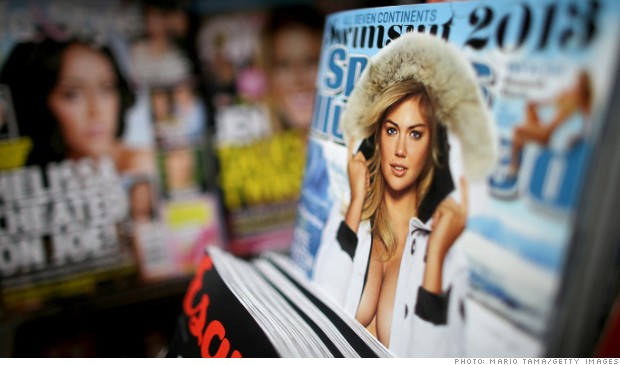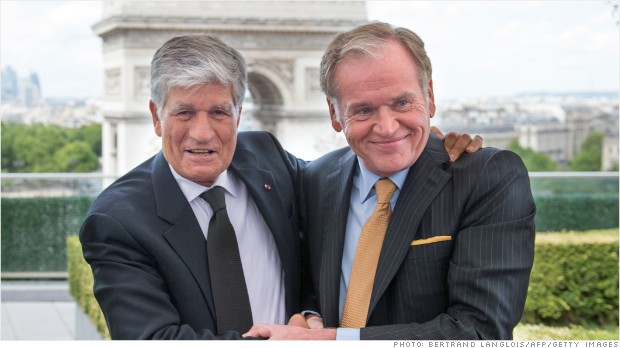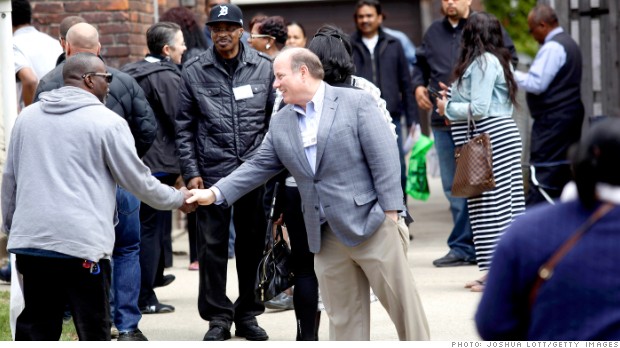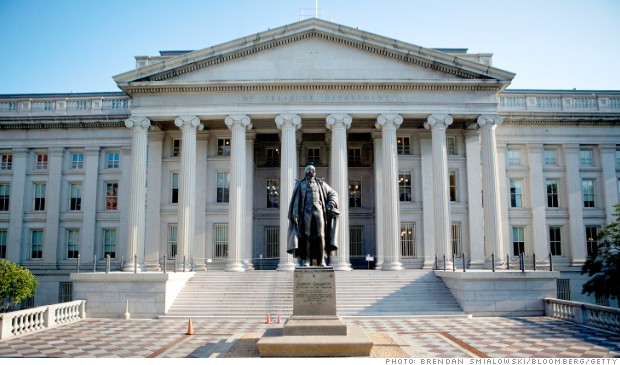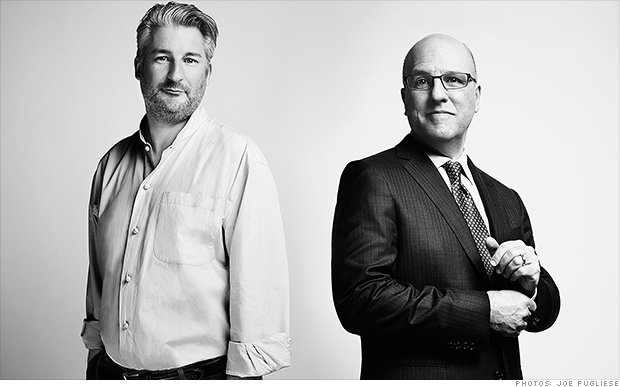
James Montier (L) says stock returns won't keep up with inflation over the next seven years. Richard Bernstein (R) thinks the five-year-old bull market has several more years to run.
(Money Magazine)
Holding vastly different opinions are two strategists with decades of insight and experience. Richard Bernstein, former chief investment strategist at Merrill Lynch, now an adviser to funds for Eaton Vance, is bullish. James Montier, who helps manage $117 billion at GMO -- itself an adviser to two Wells Fargo funds -- is bearish.
Both make strong arguments -- ones that may challenge your view of today's investing climate.
THE BULL: RICHARD BERNSTEIN
Are stocks overpriced?
The market is priced roughly at fair value. You have to look at valuations in light of inflation. Our firm uses sophisticated models for that, but a rule of thumb is that the price/earnings multiple and the inflation rate should add up to less than 20.
Inflation is now at about 1.5%. The P/E for stocks in the Standard & Poor's 500, as we speak, is about 17, based on trailing earnings. So a little below 20, or roughly fair value.
Related: American Airline employees locked out of 401(k) funds -- here's why
Stocks are not cheap, but that doesn't mean the bull market is over. Pension funds in the U.S. have their lowest equity allocations in 40 years. Wall Street strategists recommend an underweight of equities. I've found, over three decades, that the consensus asset allocation is a very reliable contrary indicator of where the market is headed.
A version of the P/E that carries a lot of weight now is the one championed by Yale's Robert Shiller. By that measure, based on 10 years of earnings, P/Es are very high.
In the past, when these high Shiller P/Es signaled an overpriced market, we've had much higher rates of inflation than we do now.
Related: Tools to make your money grow
When interest rates and inflation decrease, P/Es tend to expand. When rates or inflation rise, P/Es contract. The theory is that inflation eats away at a company's future value, for several reasons. Earnings might rise, but inflation-adjusted earnings might not. Earnings quality tends to decline, in part because you're simply paying off debt with cheaper dollars. And overall investor confidence tends to deteriorate. So you have to adjust for inflation, but professor Shiller doesn't.
If you do adjust for lower inflation, it predicts normal returns -- about 8% to 9% a year. We look at more than valuation, though. For example, sentiment is still attractive. We actually think you're going to get above-average returns -- say, 10% to 15% a year over the next several years.
Two years? Five years?
I think we're halfway through one of the biggest bull markets of our careers. The stock market has been up for the same reason it always goes up in an early-cycle environment. Expectations are extremely low, monetary and fiscal policies kick in, and the economy begins to grow. That's what happens every cycle, and it happened this cycle too.
Now we are entering a mid-cycle phase in which you get the tug of war between rising rates -- a bearish sign -- and unanticipated improvement in the economy -- a bullish sign. Sentiment isn't exactly ebullient, and the economy keeps improving.
Related: How to get in trouble in your 401(k)
But when your readership believes there's no risk in equities, the bull market is almost over. And in the kiss of death, the yield curve inverts, meaning that long-term interest rates drop below short-term rates. In other words, people are so desperate to lock in long-term rates that they pay more for them than for short-term rates.
Watching for an inverted yield curve will keep you out of trouble. That simple little indicator suggests the bond markets are beginning to expect significantly weaker growth. Generally this occurs before the stock market begins to anticipate slower growth. And we haven't seen it yet.
You've noted that a classic sign of a bubble is increased use of borrowed money to invest. Margin buying of stocks is at a record high.
Nobody knows how much of that is long -- betting that stocks will rise -- and how much of it is short -- betting stocks will fall. In the past, when individuals played a greater role in the market, you assumed that margin was used to be levered long. Today hedge funds are a much bigger force, and my research suggests they're relatively neutral. Some of that margin is being used for shorting. So I don't think increased leverage is driving up prices.
What other bubble indicators do you look for?
When sentiment becomes overwhelmingly bullish to the point where people jettison diversification, that is very, very worrisome.
Related: How we feel about our finances
You see that now in highflying tech, social media, some biotech. Valuations are so out of whack with reality. You'd think that people would have learned from the hot stove.
What do you say to analysts who worry that equities are inflated by the artificial suppression of interest rates by central banks?
I get that question all the time. The point of stimulative monetary policy has always been to artificially inflate asset prices. Interest rates are lowered so that people take more risks and multiples expand. Companies get a cheaper cost of capital, which they can then use to invest.
The notion that the Fed is the only reason the stock market is up is what people claim during the early stages of every bull market. The time to worry is when the Fed inflates asset prices too much and the characteristics of a bubble emerge.
What happens if earnings -- the "E" in P/E -- drop to historical norms?
Profit margins are at an all-time high. There's no doubt about that. But profit levels are also a function of sales. When margins compress, companies generally start to fight for market share. We think earnings forecasts for large-cap multinationals may be way too optimistic; we are concerned about emerging markets and the impact they could have on multinationals' earnings. But domestic U.S. manufacturing is gaining market share. I'm not talking about 3D printing. I'm talking about ball bearings and grease. Small- and mid-caps.
Examples, please?
I'm not a stock picker. But we believe investors should probably focus on more domestically oriented stocks and avoid emerging-market stocks as much as possible. In addition, since profit margins around the world seem likely to contract, investors should aim at market-share gainers. We like U.S. small-cap industrials. If you know the name of the company, the odds are that they have too much international exposure.
Also, I think that high-yield municipal bonds are a tremendous value play right now.
Really?
They yield more than high-yield corporates for the first time in history.
So when will you know your portfolio is overpriced -- that it's time to get out of small-cap industrials or high-yield munis?
We look at gaps between perception and reality. Over the past several years, the sentiment toward small-cap stocks, despite their superior performance, has been quite poor. But ultimately that gap between perception and reality will begin to change.
There will be more negative-earnings surprises because expectations get too high. Flows into small-cap funds will pick up. We'll hear people talking about how cheap they are, as opposed to how expensive they are. [Laughs.] Then we'll find other investments that look more attractive.
THE BEAR: JAMES MONTIER (cont.)
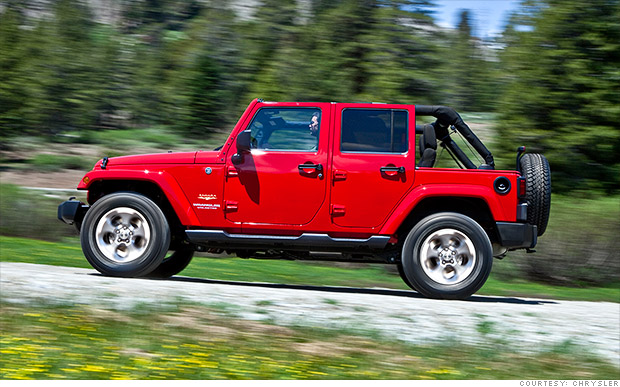
![]()
